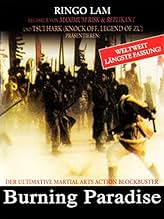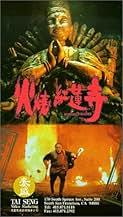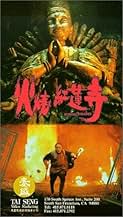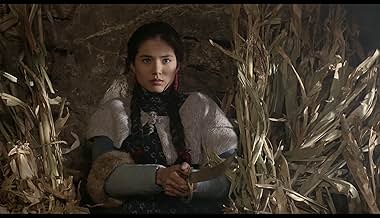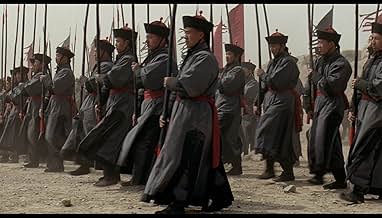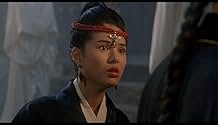Huo shao hong lian si
- 1994
- 1 घं 44 मि
IMDb रेटिंग
7.0/10
1 हज़ार
आपकी रेटिंग
अपनी भाषा में प्लॉट जोड़ेंAn exotic and legendary battle between the forces of good and evil comes to life when the celebrated disciples of the Shaolin Temple fight against the evil followers of China's Manchu rulers... सभी पढ़ेंAn exotic and legendary battle between the forces of good and evil comes to life when the celebrated disciples of the Shaolin Temple fight against the evil followers of China's Manchu rulers.An exotic and legendary battle between the forces of good and evil comes to life when the celebrated disciples of the Shaolin Temple fight against the evil followers of China's Manchu rulers.
फ़ीचर्ड समीक्षाएं
Yes, a well-choreographed martial arts melodrama from Ringo Lam. It is relentlessly bloody, adding a certain black-magic flair with the repulsive arch-villain in the story. Shaolin monks fight for their survival against Qing dynasty henchmen who are in hot pursuit of the monks. A number of kungfu battles ensue, building to the climatic ending with Shaolin masters against the black arts. Of particular interest is the view of the Qing dynasty as a source of evil in China. In fact they were regarded as "foreign invaders", eventually "ousted" in the early 20th Century. Today, due to political expediency, the Chinese communist party has chosen to delete this historic inconvenience from official history, as they refuse to admit that China today actually represents several previously autonomous regions.
10winner55
This is one of the finest films to come out of Hong Kong's 'New Wave' that began with Tsui Hark's "ZU: Warriors of Magic Mountain". Tsui set a tone for the New Wave's approach to the martial arts film that pretty much all the directors of the New Wave (Jackie Chan, Sammo Hung, Wong Jing, Ching Siu Tung, etc.) accepted from then on as a given; namely, the approach to such films thenceforth would need more than a touch of irony, if not outright comedy. "Burning Paradise" put a stop to all that, and with a vengeance.
It's not that there isn't humor here; but it is a purely human humor, as with the aged Buddhist priest at the beginning who somehow manages a quick feel of the nubile young prostitute while hiding in a bundle of straw. But this is just as humans are, not even Buddhist priests can be saints all the time.
When irony is at last introduced into the film, it is the nastiest possible, emanating from the 'abbot' of Red Lotus Temple, who is a study in pure nihilism such as has never been recorded on film before. He is the very incarnation of Milton's Satan from "Paradise Lost": "Better to rule in Hell than serve in heaven!" And if he can't get to Satan's hell soon enough, he'll turn the world around him into a living hell he can rule.
That's the motif underscoring the brutal violence of much of the imagery here: It's not that the Abbot just wants to kill people; he wants them to despair, to feel utterly hopeless, to accept his nihilism as all-encompassing reality. Thus there's a definite sense pervading the Red Temple scenes that there just might not be any other reality outside of the Temple itself - it has become all there is to the universe, and the Abbot, claiming mastery of infinite power, is in charge.
Of course, fortunately, the film doesn't end there. Though there are losses, the human will to be just ordinarily human at last prevails. (If you want to know how, see the film!) Yet there is no doubt that, in viewing this film, we visit hell. Hopefully, we do not witness our own afterlives; but we certainly feel chastened by the experience - and somehow better for it over all.
It's not that there isn't humor here; but it is a purely human humor, as with the aged Buddhist priest at the beginning who somehow manages a quick feel of the nubile young prostitute while hiding in a bundle of straw. But this is just as humans are, not even Buddhist priests can be saints all the time.
When irony is at last introduced into the film, it is the nastiest possible, emanating from the 'abbot' of Red Lotus Temple, who is a study in pure nihilism such as has never been recorded on film before. He is the very incarnation of Milton's Satan from "Paradise Lost": "Better to rule in Hell than serve in heaven!" And if he can't get to Satan's hell soon enough, he'll turn the world around him into a living hell he can rule.
That's the motif underscoring the brutal violence of much of the imagery here: It's not that the Abbot just wants to kill people; he wants them to despair, to feel utterly hopeless, to accept his nihilism as all-encompassing reality. Thus there's a definite sense pervading the Red Temple scenes that there just might not be any other reality outside of the Temple itself - it has become all there is to the universe, and the Abbot, claiming mastery of infinite power, is in charge.
Of course, fortunately, the film doesn't end there. Though there are losses, the human will to be just ordinarily human at last prevails. (If you want to know how, see the film!) Yet there is no doubt that, in viewing this film, we visit hell. Hopefully, we do not witness our own afterlives; but we certainly feel chastened by the experience - and somehow better for it over all.
(1994) Burning Paradise
(In Chinese with English subtitles)
ACTION/ HISTORICAL FICTION/ COMEDY
Another 'Fong Sai Yuk' period period piece whereas most of the action takes place in the "Red Lotus Temple" similar to tombs the Indiana Jones does his adventures in except that the person who lives in this one pretty much may also be the one who build and designed it. Anyways, cult martial art figure baddie has main objective was to capture and destroy all the Shaolin Temples before making their pupils/ students to work as slaves for the "Red Lotus Temple" showcasing folk lore hero Fong Sai-yuk at beginning stages attempting to run away from being captured along with his Shaolin teacher but are eventually captured. Wires was used for the fights at the early stages but not so much as the film progresses.
Another 'Fong Sai Yuk' period period piece whereas most of the action takes place in the "Red Lotus Temple" similar to tombs the Indiana Jones does his adventures in except that the person who lives in this one pretty much may also be the one who build and designed it. Anyways, cult martial art figure baddie has main objective was to capture and destroy all the Shaolin Temples before making their pupils/ students to work as slaves for the "Red Lotus Temple" showcasing folk lore hero Fong Sai-yuk at beginning stages attempting to run away from being captured along with his Shaolin teacher but are eventually captured. Wires was used for the fights at the early stages but not so much as the film progresses.
The Red Lotus Temple, where most of Ringo Lam's "Burning Paradise" takes place, is a real house of horrors. The temple prison is where followers of Shaolin are taken, mostly to be killed in various gruesome ways. The lead character, Fong Sai Yuk, is a Chinese hero who has appeared in other movies, such as the two starring Jet Li. Here, Fong Sai Yuk's opponent is the insane military man who controls the temple. This guy is impervious to weapons, as Fong finds out early in the picture. More than anything else, "Burning Paradise" is a horror movie. Instead of a haunted house where visitors die, you have prisoners in a temple in which there seems to be no escape. Still, the movie is well made. If this movie were released in the US, it would easily get an R-rating for violence.
Burning Paradise is an Amazing movie. I loved Magnificent Tiger Stance combined with Incredible Crane Stance. Willie Chi is a great Martial Artist, almost as good as Jet Li. This a must see, and a must buy movie. The story is about Fong Sai Yuk and Hung Hey-kwun. Fong is fighting The evil Manchus. And Hung is pretending to be a Manchurian, but he is really drawing a map of the Red Lotus Temple. In the end Fong has to save his girlfriend and fight the very powerful and evil Elder Kung. I give this movie 9/10.
क्या आपको पता है
- ट्रिवियाNot related to the previous two Fong Sai-Yuk movies with Jet Li. Even if this was released only a year later and has some of the same style of comedy and martial arts action.
- कनेक्शनRemake of Jiang hu qi xia (1965)
टॉप पसंद
रेटिंग देने के लिए साइन-इन करें और वैयक्तिकृत सुझावों के लिए वॉचलिस्ट करें
- How long is Burning Paradise?Alexa द्वारा संचालित
- What are the differences between the HongKong Version and the German Version?
विवरण
इस पेज में योगदान दें
किसी बदलाव का सुझाव दें या अनुपलब्ध कॉन्टेंट जोड़ें


